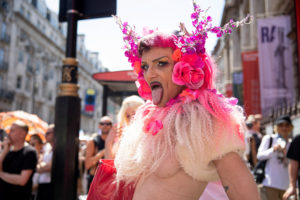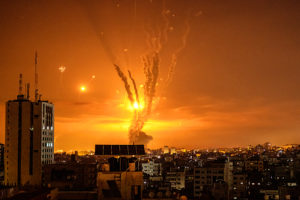It was over ten years ago that Occupy protestors visited St Paul’s cathedral. Many of those involved have now graduated to Extinction Rebellion. And over the next few weeks they plan to take to the streets of London, Cardiff and Manchester with acts of civil disobedience to draw attention to the climate catastrophe of global warming.
I was lying on a sun lounger when a call came through to ask if I would like to take part in The Reunion, a Radio 4 programme bringing together those involved with Occupy to reminisce about the significance of that movement. I wearily declined. Being over 2,000 miles away from the steps of St Paul’s made this an easy decision. But I may have declined anyway. My protesting days are over.
“I have sung Joan Baez’s We Shall Overcome for years, but nothing has changed” was how an old friend of mine expressed the same weariness — not so much a cynical acceptance of the status quo, more a feeling of being beaten down by political reality. Many of the friends I made during the Occupy protest had various sorts of breakdown after the camp was cleared. Some made for the woods to find themselves again, some were burnt out and plunged into depression, others found the emotional wherewithal to reboot their protesting energy, and I admire them for this. We Shall Overcome began life as a Methodist hymn, words taken from the letter of Paul to the Galatians: “Let us not grow weary in doing good, for at the proper time we will reap a harvest if we do not give up.”
Protesting, even to the point of civil disobedience, has a great deal of religious energy about it — one might even say Christian energy. It is not insignificant that protester and Protestant share an obvious etymology. In the letter to the Galatians, Paul was exhorting his fellow Christians to place faith above the religious law. His major concern was a distant dispute about circumcision, but the philosophical way he addressed this issue — setting faith and law against each other — has provided a kind of justification for protesters ever since. It makes no difference that this may be a misreading of Paul, whether the target is the government or the Pope, the disruptive energy of Galatians has reshaped the world. So why am I rooted to my sun lounger? Am I not convicted by this inaction, especially as I am slapping on the sunscreen whilst directly facing the Sea of Galilee, a few miles from where all this disruptive energy was first expressed, at least in my tradition?
Yes, there are things about the “spirituality” of the protestor that have come to bother me, not least an overconfidence in what they think of as “doing good” — an overconfidence that can spill over into self-righteousness, that abiding condition of many on the progressive Left. Is it really OK to block the path of ambulances on their way to hospital or people trying to go about their legitimate business? If the cause is weighty enough, the means can be justified. This can provide a dangerous licence to behave badly, the virtue of the cause obscuring an obligation to common human decency. But there again, if the cause is something like the Civil Rights movement and yes, even the Climate Catastrophe, then emergency measures can feel necessary. I wish I knew how to square this circle.
Back in the late Sixties, the two famous Czech writers, Milan Kundera and Václav Havel, began an ongoing spat about the value and dangers of the protesting mindset with respect to the so-called Prague Spring of 1968. Following a period of liberalisation and democratisation — “socialism with a human face” they called it — the Soviet Union sent half a million soldiers into Czechoslovakia to reverse the changes. Eight months of protest followed: some sabotaged street signs, some set themselves ablaze. Havel admitted that there was no hope, but nonetheless proposed “risky” protest. In a fierce essay called Radicalism and Exhibitionism (1969), Kundra went for the jugular.
“Havel states that no hopes endured, but unlike most people this does not arouse in him resignation or defeatism, but on the contrary a strengthened longing for action. But to what end action, when no hopes endured? … Such action has only a twofold aim: (1) to unmask the world in all its irreparable amorality, and (2) to display its author in all his pure morality.
“In this way what was originally a purely moral attitude (the rejection of the unjust world) has turned into pure moral exhibitionism. The effort to publicly demonstrate the beauty of one’s own morality outweighs the effort to change things for the better…”
I do not want to take a deep dive into Czech politics, but it should be said — contra Kundera — it was protesters and the memory of those who had given their lives during the Prague Spring that kept the energy going and helped topple the Soviet regime in 1989. And, of course, Havel became President. This is the moral dilemma: Kundera has, to my mind, a compelling point about the moral exhibitionism of protest, but Havel seemed to be on the right side of history.
This same energy of protest is now being focused, not just against those who deny the gravity of the current environmental crisis, but also against the Tories whose indifference to the cost-of-living crisis seems evident to many of us. Around 1,500 people packed Manchester Cathedral on Tuesday evening to protest that “Enough is Enough”, and call for a national day of action on 1 October. Another movement called Don’t Pay UK is co-ordinating a mass non-payment of energy bills and blockades of petrol stations. As a church we are thinking about establishing ourselves as a “warm bank” for local people who may have to choose between food and heating, even in a relatively prosperous place like Kew.
But we want affordable energy and we want environmentally friendly energy — not necessarily a straightforward combination. We want to stand with the people of Ukraine, but we flinch when the Russians turn the gas off. I can’t say I like the look of this coming Tory government and their cold-heartedness towards the poor. But it’s not all about the Tories.
Protest is often a legitimate cry against the detrimental impact of human action towards the world and especially the most vulnerable, but it is not always the best means of providing solutions, especially ones with full democratic legitimacy. “We shall overcome” is not a programme of action.
So am I still the protesters’ friend? I may be tired and still a little burnt out, but I know what I have to say: of course. Because in the end, despite all my Kundera-like pessimism of human nature, I am equally Eeyore-ish about change ever taking place without grassroots political pressure. So perhaps I should lift myself off my metaphorical sun lounger and get back involved. I still feel a little emotionally burned from my experience during Occupy. I too felt the darkness after it ended. And I do still fear the way in which protest can become morally high on its own supply of virtue. But I must get over this debilitating melancholy. Sometimes we have little choice.
Disclaimer
Some of the posts we share are controversial and we do not necessarily agree with them in the whole extend. Sometimes we agree with the content or part of it but we do not agree with the narration or language. Nevertheless we find them somehow interesting, valuable and/or informative or we share them, because we strongly believe in freedom of speech, free press and journalism. We strongly encourage you to have a critical approach to all the content, do your own research and analysis to build your own opinion.
We would be glad to have your feedback.
Source: UnHerd Read the original article here: https://unherd.com/



